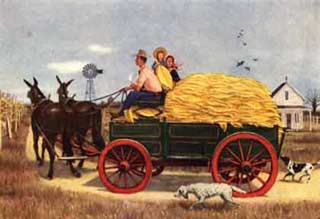|
|
||
 |
| Welcome | Contact | Getting Started | Site Map | Resources | 1 | 2 | 3 | 4 | 5 | 6 | 7 | 8 | 9 | 10 |
Unit 6 - The Sociological Imagination
I am the captain of my ship and the master of my fate
What sentiment could be more American? We Americans like to think that we choose our own destiny. That we, and no one else, is responsible for what happens to us. It is a central part of our culture. It is one of those cultural beliefs that everyone acquires as they grow up in this society. We believe that we are in control of what happens to us and that we, ultimately, are responsible for our own fate. The self-made man is an icon in American society; pulling oneself up by ones bootstraps an American legend.
Sociologists don’t really buy into this cultural belief. We believe that we are much more affected by historical events than most of us realize. We think that people are very much at the mercy of the time and place in which they live. Who we are and what we become is in large part due to the year of our birth and the knowledge and technologies available in our society. The history of our time affects how we see the world, how we do our work, and, often, whether we live or die.
Before the industrial revolution, most Americans lived and worked on farms. They worked hard, died young, and rarely traveled more than 100 miles away from where they were born. Life was particularly hard on women. Many, many young women died in childbirth. People grew their own food, made their own clothes, and provided entertainment for themselves.
 Today,
the production of food plays a very small role in the lives of most Americans.
Less than 6% of the population lives or works on a farm. The preparation
of food, instead of being a day-long chore, has become a recreational
activity; a luxury rather than a necessity. Fast food is a way of life.
Changes in technology have changed the way we spend our time and therefore
have changed our lives. We act, think, and believe in a different way
than we would have if we were born 100 years earlier.
Today,
the production of food plays a very small role in the lives of most Americans.
Less than 6% of the population lives or works on a farm. The preparation
of food, instead of being a day-long chore, has become a recreational
activity; a luxury rather than a necessity. Fast food is a way of life.
Changes in technology have changed the way we spend our time and therefore
have changed our lives. We act, think, and believe in a different way
than we would have if we were born 100 years earlier.
Sociologists call the ability to make this connection between history and biography “the sociological imagination.” It is one of the core ideas in our discipline and a key to understanding the effects of technology in a social context. The term was coined and introduced by a sociologist named C. Wright Mills in 1959. He said,
The sociological imagination enables its possessor to understand the larger historical scene in terms of its meaning for the inner life and external career of a variety of individuals…The sociological imagination enables us to grasp history and biography and the relations between the two within society. That is its task and its promise. To recognize this task and this promise is the mark of the classic social analyst
(Mills, 1959: 5-6). (This website provides the complete text of Mills’ essay. You can read it for yourself!)
- The Sociological Imagination
- Posted on Louis and Clark College Site. This website provides the text of Mills’ essay. You can read it for yourself!
Let’s do some of this “classic social analysis” by
thinking about the intersection between history and biography in our own
lives. The basic structure of American society in the early years of the
21st century is an industrial capitalist economy rapidly shifting to a
post-industrial or information-based economy. It is part of the global
economy with economic interests in every part of the world either as trading
partners, sources of cheap labor, or threats to essential resources. It
requires educated workers. While there still is a need for laborers and
craftspeople, the primary requirement of the modern economy is for people
who can think creatively and shift from job to job with information age
skills. A college degree is a pretty essential requirement for entry level
positions in most well-paying, high status jobs. 
Isn’t that why you are taking this class? Isn’t that why you are enrolled in college in the first place? You are gaining new skills or credentials, updating the entries on your resume, or changing from an industrial career to an information age one. You wouldn’t need to do any of things if you were in the job market 50 years ago. A high school diploma was sufficient for most jobs; a college degree a luxury for professionals in a few fields. You certainly wouldn’t have needed to go college as an adult 100 years ago. Very few men and almost no women went to college. Now it’s a necessity so you organize your life, for some period of time, around your need for an education. History shapes your biography. Social change, changes your life.
And, look at the way in which you are taking this class! You are among the earliest adopters of distance education. Yes, we’ve had correspondence courses for quite a while and universities have taken advantage of video and audio technologies to teach at branch locations. But the advent of the world wide web and other internet technologies make a whole new educational experience possible. We are just getting started; still at the crudest stage of web-based education. But it’s available and here we are. Instead of having to be on campus, scheduling our lives around classroom schedules, taking time off work or moving our families, we are able to do the work for this course on our own time schedule. You can live where you have always lived, keep your job, be available when your family needs you and still make progress toward your degree. History shapes your biography through changes in technology.
It is easy to see how institutional and cultural changes affect our lives. Clearly life is different when you drive a car rather than a buggy and have one sibling rather than eleven. What the sociological imagination teaches us is that social change actually changes us, the people we become. We are all different people because of the historical epoch in which we live. If you had grown up in the 1950s you would have a different understanding of how the world works, your attitudes, values, and beliefs would be different. You would respond to different art, music, and movies. Old people aren't different just because they are old as we will see in the next lecture. They are different because they grew up in different historical circumstances. While sociologists don't deny the effects of genetics on human development, we suggest that the expression of genesis is affected by social factors. For example, our sex is genetic but our gender is socially defined. It means something different to be a woman or a man in 2004 than it did in 1850 or 1930 or 1950. This is one of the most important insights that I hope you will get out of this class on social change so think about it carefully as you do your group work for the week. Use your developing sociological imaginations to consider how YOU are shaped as a person by social change.
| |
| Welcome | Contact | Getting Started | Site Map | Resources | 1 | 2 | 3 | 4 | 5 | 6 | 7 | 8 | 9 | 10 |
